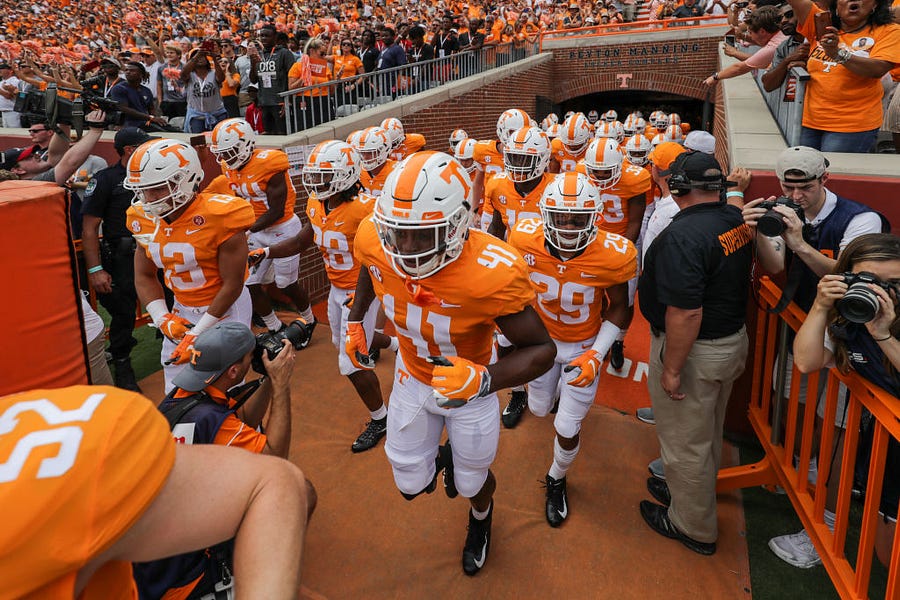On Wednesday, the NCAA Division I Board of Directors approved a set of interim policy changes allowing individual athletes to reap benefits from the use of their name, image, and likeness (NIL). The shift in policy had been recommended on Monday by the NCAA Division I Council, which includes representatives from every Division I conference. (The governance bodies for Division II and Division III followed suit.)
There is broad agreement about what the changes mean in theory. As Haley Byrd Wilt wrote in a recent Uphill newsletter, NIL agreements would enable “lucrative advertising deals for well-known players, opportunities to earn revenue from social media posts, smaller contracts with local businesses, or simply the ability to host athletic camps for kids in their hometowns.” An Iowa basketball player has already teamed up with a local fireworks store to auction off a pair of game-worn shoes. Athletes who pursue NIL agreements will no longer be punished by the NCAA, which has long cloaked its opposition to compensation for athletes in the language of amateurism. For a select number of athletes, these agreements could be highly lucrative: A recent study estimated that the Instagram account of quarterback Trevor Lawrence, who won a national championship with Clemson in 2019 and was the first pick in the NFL Draft, could have an annual value of more than $300,000.
The trouble is that no one really knows yet what the nitty-gritty details of NIL will look like in practice. The NCAA was essentially forced to act by July 1 as 13 states have NIL laws or executive orders going into effect today and several others have laws that will kick in over the next few years. Although these state laws share many similarities, there are some differences, and the NCAA adopted its policy changes on an interim basis. Absent federal legislation from Congress, the system is ripe for confusion.
“If you have one state that’s an outlier compared to the rest, it can create a competitive advantage or disadvantage, depending on where you are relative to that state,” Jason Donnelly, the athletics director at Furman University, told The Dispatch. “If the state of Alabama has a totally different clause that allows student athletes in Alabama to do things differently than the rest of the nation, that can make them at an advantage or a disadvantage, depending on how you look at it.”
Congress has several bills coming down the pike that could provide a national standard—something that Southern Conference Commissioner Jim Schaus described as an “ultimate ideal scenario.” One bill, the Student Athlete Level Playing Field Act, introduced by GOP Rep. Anthony Gonzalez and Democratic Rep. Emmanuel Cleavers, has been endorsed by the NCAA—but Gonzalez told The Dispatch it is “unlikely the House moves before the Senate.”
While all athletes are eligible to profit from their likenesses, each institution will set its own policy—potentially creating an inconsistent patchwork of rules. “Our role is to communicate to our membership the information that we have to try to assist them in making the best choices on their campus, how they’re going to be dealing with name, image, and likeness,” Schaus said. “But it’s their individual institution’s decision, provided that they’re still remaining in the NCAA guidelines. … The NCAA is going to have to have some grace, which I believe they will, in working through this interim period. I think eventually we’ll work our way through it and land in a place that works. But when that’s going to be, what exactly that’s going to look like, we don’t know.”
For the most part, schools outside the “Power Five” conferences—the Southeastern Conference, the Big Ten, the Big 12, the Pac-12, and the Atlantic Coast Conference—won’t have to worry as much about navigating the intricacies of NIL agreements for Trevor Lawrence-level talents. But that doesn’t mean smaller schools will be unaffected. Players from smaller conferences can steal the show during the NCAA March Madness basketball tournament, for example, and athletes who were minor celebrities back in their hometowns might attract local business sponsorships. INFLCR, a brand-management company, is now offering NIL-compliance services to a host of colleges.
The NCAA’s new guidelines are also bound to impact recruiting and transfers. “When you have a student athlete that has a very high level of marketability, there will become points where it may become a bidding war, where NIL could be involved as a trigger to try to get an athlete to commit to an institution,” Donnelly said. “But I think you’re gonna see a lot of that playing out really early … even before they get to college.” High-school recruits will factor potential NIL earnings into their college decisions, and elite talents at smaller, lesser-known schools will have serious financial incentives to transfer up.
At this early stage, there are still more questions than answers. But one thing is clear: For the first time since the NCAA was founded by President Theodore Roosevelt in 1906, student athletes in America now have the opportunity to market themselves without fear of losing eligibility—and that opportunity isn’t going away. “Its time has come,” Schaus said.









Please note that we at The Dispatch hold ourselves, our work, and our commenters to a higher standard than other places on the internet. We welcome comments that foster genuine debate or discussion—including comments critical of us or our work—but responses that include ad hominem attacks on fellow Dispatch members or are intended to stoke fear and anger may be moderated.
You are currently using a limited time guest pass and do not have access to commenting. Consider subscribing to join the conversation.
With your membership, you only have the ability to comment on The Morning Dispatch articles. Consider upgrading to join the conversation everywhere.